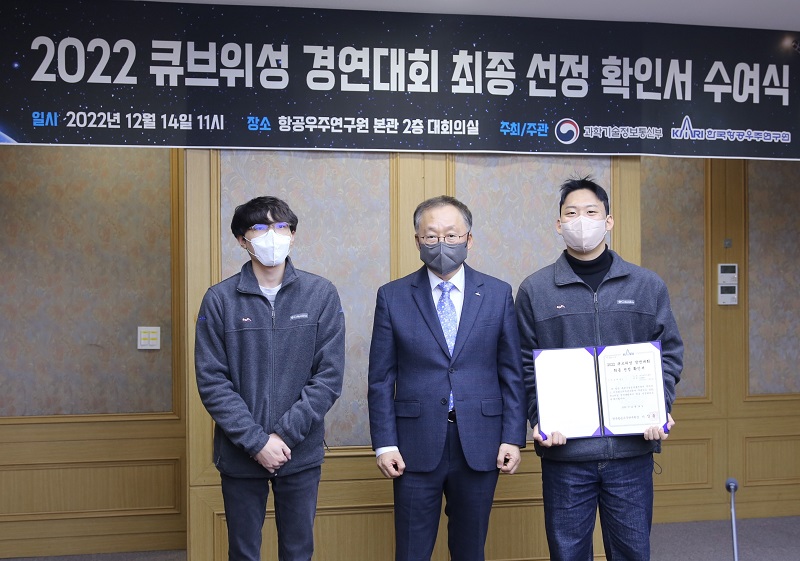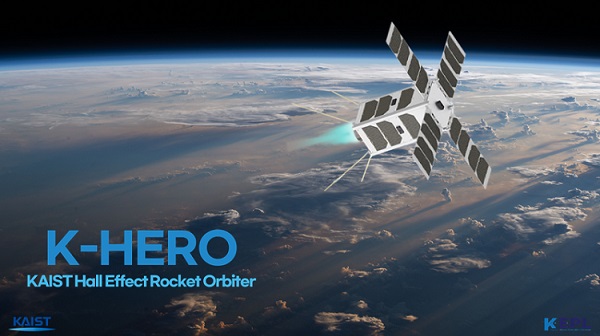
우리 대학 원자력및양자공학과 최원호 교수 연구팀이 한국항공우주연구원이 주관한 ‘2022 큐브위성 경연대회’에서 기초위성분야에 최종 선정됐다고 19일 밝혔다. 특히 이번 대회에서 항공우주공학과 윤효상 교수 연구팀도 함께 선정되어 KAIST는 복수의 팀이 선정되는 쾌거를 이뤘다.
이번 대회 선정팀은 큐브위성 개발비용(기초위성 3억원/고급위성 7.5억원)과 발사 기회(누리호 4차 발사, 2025년 예정)를 제공받게 되며 항우연으로부터 위성 설계 검토, 우주환경시험 등 큐브위성 제작에 필요한 각종 기술을 지원받게 된다.

최 교수 연구팀이 개발하는 위성의 이름은 K-HERO(KAIST Hall Effect Rocket Orbiter)로 초소형위성용 홀추력기의 궤도 검증을 목표로 한다. 홀추력기는 위성 전기추력기의 일종으로 궤도 조정, 군집비행 등의 위성 기동에 필수적인 기술이다.
최 교수 연구팀은 지난 20여 년간 약 20여 종의 홀추력기(50-2,000 W급) 연구개발을 수행하며 국내 전기추력기 연구를 선도하고 있다. 특히 최 교수 연구팀이 개발한 10 mN급 홀추력기는 2013년 발사된 과학기술위성 3호에 탑재되어 임무를 수행한 바 있다.
연구팀은 이번 임무를 통해 큐브위성용 홀추력기의 상용화에 성공한다면 전 세계적으로 증가하고 있는 큐브위성용 추력기 수요에 대응할 수 있을 것이며 국내 큐브위성 업계의 경쟁력 제고에도 기여할 수 있을 것으로 기대한다고 밝혔다.
The research team led by Professor Wonho Choe of the Department of Nuclear and Quantum Engineering at our university was announced on the 19th to have been selected as a finalist in the Basic Satellite category at the ‘2022 CubeSat Competition’ hosted by the Korea Aerospace Research Institute (KARI). Notably, in this competition, the research team led by Professor Hyosang Yoon of the Department of Aerospace Engineering was also selected, and KAIST achieved the remarkable feat of having multiple teams selected.
The teams selected in this competition will be provided with CubeSat development costs (300 million won for basic satellites/750 million won for advanced satellites) and launch opportunities (scheduled for the 4th launch of Nuriho in 2025). They will also receive support for various technologies needed for CubeSat production, such as satellite design review and space environment testing, from KARI.
The satellite being developed by Professor Choe’s research team is named K-HERO (KAIST Hall Effect Rocket Orbiter), and aims to verify the orbit of Hall thrusters for microsatellites. Hall thrusters are a type of satellite electric thruster and are essential technology for satellite maneuvers such as orbit adjustment and swarm flight.
Professor Choe’s research team has been leading domestic electric thruster research by conducting research and development of about 20 types of Hall thrusters (50-2,000 W class) over the past 20 years. In particular, the 10 mN Hall thruster developed by Professor Choe’s research team was installed on the Science and Technology Satellite 3, which was launched in 2013, and has successfully completed its mission.
The research team stated that if they succeed in commercializing the Hall thruster for CubeSats through this mission, they will be able to meet the growing global demand for thrusters for CubeSats and also contribute to enhancing the competitiveness of the domestic CubeSat industry.

